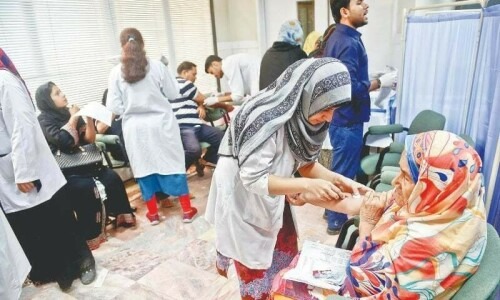KARACHI: Experts at a conference emphasized the importance of early screening and vaccination, pointing out that hepatitis B poses a severe threat to public health in Pakistan, where 2.5 percent of the population is afflicted.
In association with the Department of Continuous Medical Education, Ward 7 of the Jinnah Postgraduate Medical Centre (JPMC) at Jinnah Sindh Medical University (JSMU) arranged the lecture entitled “Let’s Get Rid of Hepatitis B.”
Experts discussing the topic revealed that 296 million individuals globally, including more than six million children under five, were afflicted by hepatitis B.
Hepatitis B causes the deaths of about 820,000 individuals annually. Prof. Masroor Ahmed, the head of Ward 7 at Sindh Medical College and principal, stated that hepatitis is a condition that can be avoided and that a vaccination is available to prevent hepatitis B.
According to a seminar, 2.5 percent of the population in the nation is infected.
Prof. Amjad Siraj Memon, vice chancellor of JSMU, discussed the precision of illness diagnosis and surveillance.
It might not always be achievable with just ultrasonic imaging. Other diagnostic techniques or cautious treatment approaches would be more appropriate in such cases, the speaker stated.
Prof. Nasir Luck, senior gastroenterologist at Sindh Institute of Urology and Transplantation (SIUT), states that the main objective of the therapy is to improve long-term survival outcomes by reducing the incidence of liver cancer, halting the progression of the disease, and slowing down the advancement of cirrhosis.
He said, “This all-encompassing approach aims to enhance the overall wellbeing of patients in order to manage the condition effectively.”
Prof. Nasir further mentioned that by 2030, viral hepatitis should no longer pose a hazard to public health because the World Health Organization (WHO) has implemented a global hepatitis plan.
“This goal comprises a sixty-five percent decrease in death from chronic hepatitis B and C infections as well as a ninety percent reduction in new cases,” he stated.
Hepatitis can harm women who are pregnant or nursing, according to Dr. Zeeshan Ali Junejo, an associate professor of medicine at the JSMU and the chief of the medical intensive care unit and Medical Unit 4 at the JPMC.
“To avoid passing the virus to the unborn child, pregnant women should get tested for hepatitis B. If the child gets the required vaccines, breastfeeding is typically safe for women with hepatitis B, the speaker continued.
He emphasized the importance of seeking individualised advice from a healthcare professional on controlling hepatitis throughout pregnancy and lactation.








